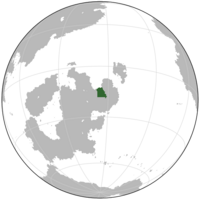Balbaher
State of Balbaher دولة بلبلير (Balbaher) Dawlat Balbaliir | |
|---|---|
| Anthem: Allah Above All | |
 | |
| Capital and largest city | Abu Anus |
| Official languages | Balbaher An-Naas |
| Ethnic groups (2022) |
|
| Religion (2023) |
|
| Demonym(s) | Balbaheran |
| Government | Unitary presidential republic under an authoritarian dictatorship. |
| Zayed Al Nahyan | |
| Mohammed bin Rashid | |
| Legislature | National Council |
| Establishment | |
• Independence | 4 July 1985 |
| 1986-1991 | |
| 3 May 2006 | |
| Area | |
• Total | 305,294 km2 (117,875 sq mi) |
| Population | |
• 2023 estimate | 44,100,000 |
• 2023 census | 43,912,064 |
• Density | 144.45/km2 (374.1/sq mi) |
| GDP (nominal) | 2022 estimate |
• Total | |
• Per capita | |
| Gini (2022) | very high |
| HDI (2022) | high |
| Currency | Balbaher Yenaholi (¥) (BBY) |
| Date format | dd-mm-yyyy |
| Driving side | right |
| Calling code | +911 |
| ISO 3166 code | BL |
| Internet TLD | .bl |
Balbaher, officially the State of Balbaher, is a country in northern Galia. It borders Sahilban and Dumtina to the west, Yawatha and Temelaeli to the east, Janolia to the south, and the north is formed by the Achrinian Ocean coastline. Its capital and largest city is the coastal port of Abu Anus. The country covers an area of roughly 305,294 square kilometers and has a population of roughly 44.1 million with a relatively high population density, with much of the country being tropical or subtropical climate conducive to agricultural. The largest ethnic group is by far Balbahers, but minorities of Janolians and Yawathans are present throughout the country. Balbaher is promoted as a language of commerce and government and the vast majority of the population are thus fluent in the language. Just as in all other Aravian Countries, the official count of Balbahers is considered highly skewed due to the ease of Ashmalans and Sahilbans with integrating into the Balbaher majority. Thus, much like in Ashmala or Sahilban, there is a likely undercount of other Aravian groups, though this undercount would be difficult to correct and is likely meaningless due to these Sahilbans and Ashmalans considering themselves to be Balbahers regardless.
Much like the rest of Aravia, the territory of what is now Balbaher has historically been inhabitated by nomadic groups and empires, though the lack of natural resources and drier portions of Balbaher reduced the viability of centralized empires, and instead most of the territory was nomadic and dominated by empires from Sahilban. In antiquity, various Sahilban empires inhabitated the land and fought for primacy in the region, and the Aravian Empire expanded to cover most of what is now Sahilban, Balbaher, and Ashmala. The Aravian Empire modernized much of Sahilban and overturned the native nomadic movements in favor of centralizing the polity and state underneath the imperial government. In the 18th century, Tiryetsan-speaking colonists from Gryva arrived and introduced the Islam and Druze faiths to the region. By the mid-19th century, the Tiryetsans nominally ruled all of Aravia as part of a puppet state headquartered in Yenrazi. Following the First Great War, the Tiryetsan colonies went independent and became aligned with the Yawatha. In 1938, in a questionable annexation, Aravia was annexed as the Aravian Autonomous Republic within the Yawathan National Republic. During the dissolution of Yawatha, Aravia split into three countries down the roughly linguistic groups.
Shortly after independence, a conflict between Islamists who favored a centralized state, called "Statists", and reformers who favored a federal liberal democracy, called "Liberals" halted the development of a constitution. These disputes erupted into war between the Balbaher Free State and the State of Balbaher into a five year conflict called the Free State War. The war would kill several hundred thousand people and destroy much of the country's urban areas, and the conflict became a flashpoint between the emerging Mutual Defense Pact and the countries of the late Third Coalition. The Free State War would end with the State of Balbaher claiming control of the county, a major blow to the growing Galian Entente.
Since the end of the war, Balbaher has been criticized as being an authoritarian state with a poor human rights record. The country discriminates against non-Muslims and non-Druze citizens. The primary export are cash crops like sugar cane, cotton, and palm oil. This has resulted in Balbaher having one of the worst wealth inequalities on the planet, with much of the income and political power lying in the oligarchs who own the sugar cane, cotton, and palm oil plantations. Balbaher is de jure a democratic republic, but is de facto an Islamic authoritarian state with no free or fair elections in the country. Balbaher is a member of the Global Community and the Mutual Defense Pact.
